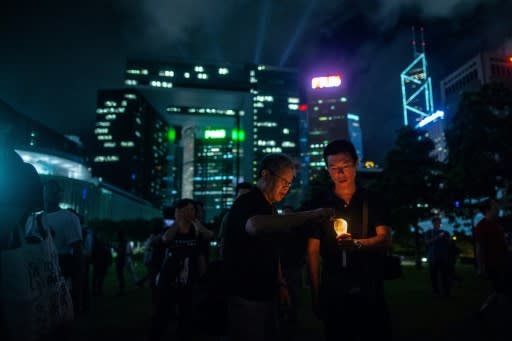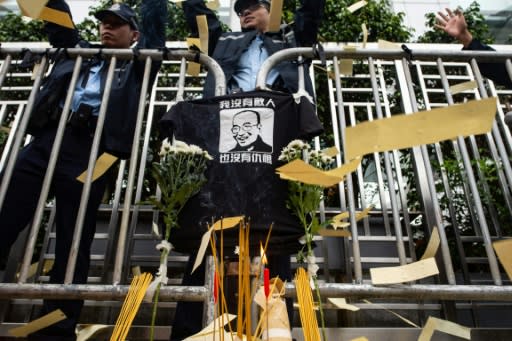Hong Kong activists mark one year since Liu Xiaobo death
Activists in Hong Kong and Taiwan marked one year since the death in custody of Nobel dissident Liu Xiaobo on Friday, in stark contrast to an enforced silence in mainland China. A vigil was held in Hong Kong near the city government's offices, while the anniversary was marked with sculptures, statements and performance art elsewhere in Asia and Europe. A veteran of the 1989 Tiananmen Square protests, democracy activist Liu died from liver cancer while serving an 11-year sentence for "subversion" on the Chinese mainland. The commemorations come three days after Liu's widow, Liu Xia, arrived in Germany following eight years of de facto house arrest in Beijing. The hundreds of mourners that gathered in Hong Kong Friday night carried candles in tribute to Liu Xiaobo, as a minute's silence was held. Barrister Wilson Leung, 35, said he admired Liu's ability to avoid being bitter. "He said he had no enemies. He is an amazing and admirable spirit," Leung said. A 17-year-old boy from mainland China, disguising himself by wearing a white "V for Vendetta" mask, had come to Hong Kong for the first time especially for the evening vigil. "It?s very saddening," he said. "Liu Xiaobo is from mainland China, but few know about him." He said he had first learned about Liu after he died and said he had been "inspired" by his philosophy of non-violent resistance. Activists led by exiled Chinese dissident Wu'er Kaixi also unveiled a three-part sculpture in a Taipei park on Friday night, which included an etched bronze image of Liu Xiaobo and an empty chair. The empty chair became a symbol for Liu after his imprisonment, reflecting his absence from the Nobel Prize ceremony to accept his award in 2010 due to being behind bars. Wu'er, who was a student leader at Tiananmen, said Liu had been a key adviser to him during the pro-democracy rallies which ultimately ended in bloodshed when Chinese authorities sent in tanks to crush the peaceful protests. "Liu Xiaobo does not only stand for what he advocated when he was alive. He represented an endeavour that generations of Chinese fought for," Wu'er told AFP. Student Vicky Huang, 15, who attended the memorial described Liu as a "great person". "I'm worried that many people like him are still being persecuted in China," she told AFP. - House arrest - In mainland China, authorities moved to quash any public commemoration of Liu's death, muzzling his friends and family with warnings, enforced travel orders and surveillance. "As far as I know, this year the majority of us [supporters] have been put under house arrest and under guard. At the moment we are all powerless to take action," said his close friend Ye Du. "The police are downstairs watching right now," he told AFP. Liu's ashes were scattered at sea -- a decision supporters said at the time had been forced upon his family as a way to avoid creating a pilgrimage site where he could be remembered. Yet even if there had been a tomb to visit, his family would not have been able to go, according to Lu Siqing, who runs the Hong Kong-based website Information Centre for Human Rights and Democracy. On Friday morning, "public security warned [Liu's] family members not to go to public places to pay their respects," he wrote in a statement sent to AFP, citing a conversation with Liu's sister-in-law Lin Wei. - Black ribbons - In Hong Kong dozens of pro-democracy campaigners had earlier gathered outside China's liaison office. Many in semi-autonomous Hong Kong fear freedoms in the city are being eroded by Beijing. Campaigners also called for the release of prominent Chinese democracy activist Qin Yongmin, who was jailed for 13 years on the mainland Wednesday for "subversion of state power". "(The Chinese government) released Liu Xia on Tuesday, then jailed Qin Yongmin on Wednesday," said veteran democracy activist Leung Kwok-hung, known as "Long Hair". "So to release Liu Xia was an act to hoodwink the public and pretend to show mercy," he told reporters. At the Louvre Museum in Paris, Chinese cartoonist Badiucao organised a performance in which volunteers held up large cloth prints of the Mona Lisa sporting Liu Xia's glasses and shaved haircut in front of the original painting itself. In Berlin, a large public memorial is planned, to be attended by Liu Xia's close friend Liao Yiwu -- who posted photos of the newly liberated poet grinning incandescently in a backyard garden. Liu Xiaobo was arrested in late 2008 after co-authoring Charter 08, a widely circulated online petition that called for political reform in the Communist-ruled nation. The bold manifesto, which was signed by more than 10,000 people after it went online, called for the protection of basic human rights and the reform of China's one-party system. Liu Xia had faced no charges but endured heavy restrictions on her movements and was kept under constant surveillance since 2010 when her husband won the Nobel Peace Prize, infuriating Chinese authorities. People light up candles at a memorial event in Hong Kong to mark the first anniversary of the death of late Chinese Nobel dissident Liu Xiaobo Activists led by exiled Chinese dissident Wu'er Kaixi unveiled a three-part sculpture in a Taipei park which included an etched bronze image of Liu Xiaobo and an empty chair A protester stands in front of a portrait of Liu Xiaobo during a march to the Chinese liaison office in Hong Kong The commemorations come three days after Liu's widow, Liu Xia, arrived in Germany, ending eight years under de facto house arrest in Beijing





